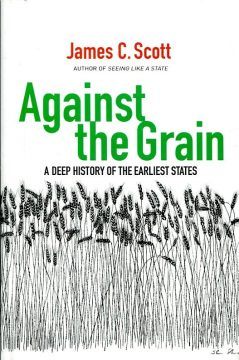Benjamin Hein in Taxis:
 Thousands of years ago, hunters tossed aside their spears and began cultivating the fruits of the earth. The arrival of agricultural society, we have long been told, marked a turning point in human history. Cultivating grains generated an abundance of food, liberating our species from its struggle with scarcity and its primitive, nomadic existence. In the first great bread basket societies such as Mesopotamia, Egypt, and Rome, humanity flourished. Well-fed and secure, we began devoting ourselves to the finer things in life, like building pyramids and exploring the universe.
Thousands of years ago, hunters tossed aside their spears and began cultivating the fruits of the earth. The arrival of agricultural society, we have long been told, marked a turning point in human history. Cultivating grains generated an abundance of food, liberating our species from its struggle with scarcity and its primitive, nomadic existence. In the first great bread basket societies such as Mesopotamia, Egypt, and Rome, humanity flourished. Well-fed and secure, we began devoting ourselves to the finer things in life, like building pyramids and exploring the universe.
That is an inspiring story about human progress, but also wrong in many ways, argues Yale political scientist James Scott in his latest book Against the Grain: A Deep History of the Earliest States. Contrary to popular belief, nomadism actually persisted for millennia and indeed predominated as the leading form of social organization for most of human history. Only around 1600 CE did grain-based sedentism begin to supersede nomadic forms of subsistence around the world. One of the reasons why this has been forgotten is our skewed reading of the source record. “If you built, monumentally, in stone and left your debris conveniently in a single place, you were likely to be ‘discovered’ and to dominate the pages of ancient history,” writes Scott. But “if you were hunter-gatherers or nomads, however numerous, spreading your biodegradable trash thinly across the landscape, you were likely to vanish entirely from the archaeological record.”
Another, perhaps more important, problem with the grain narrative is that it relies on a misleading assumption about human nature: that homo sapiens supposedly wishes nothing more in life than to settle down and munch on bread, couscous, or rice. Scott begs to differ.
More here.
